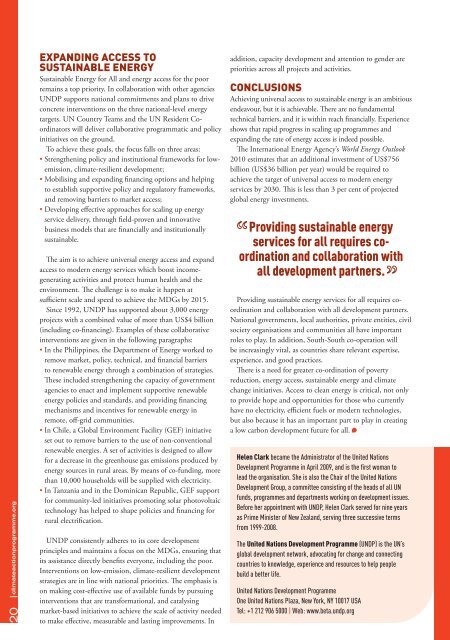Climate Action 2011-2012
Create successful ePaper yourself
Turn your PDF publications into a flip-book with our unique Google optimized e-Paper software.
20 climateactionprogramme.org<br />
expanding acceSS To<br />
SuSTainable energy<br />
Sustainable Energy for All and energy access for the poor<br />
remains a top priority. In collaboration with other agencies<br />
UNDP supports national commitments and plans to drive<br />
concrete interventions on the three national-level energy<br />
targets. UN Country Teams and the UN Resident Coordinators<br />
will deliver collaborative programmatic and policy<br />
initiatives on the ground.<br />
To achieve these goals, the focus falls on three areas:<br />
• Strengthening policy and institutional frameworks for lowemission,<br />
climate-resilient development;<br />
• Mobilising and expanding financing options and helping<br />
to establish supportive policy and regulatory frameworks,<br />
and removing barriers to market access;<br />
• Developing effective approaches for scaling up energy<br />
service delivery, through field-proven and innovative<br />
business models that are financially and institutionally<br />
sustainable.<br />
The aim is to achieve universal energy access and expand<br />
access to modern energy services which boost incomegenerating<br />
activities and protect human health and the<br />
environment. The challenge is to make it happen at<br />
sufficient scale and speed to achieve the MDGs by 2015.<br />
Since 1992, UNDP has supported about 3,000 energy<br />
projects with a combined value of more than US$4 billion<br />
(including co-financing). Examples of these collaborative<br />
interventions are given in the following paragraphs:<br />
• In the Philippines, the Department of Energy worked to<br />
remove market, policy, technical, and financial barriers<br />
to renewable energy through a combination of strategies.<br />
These included strengthening the capacity of government<br />
agencies to enact and implement supportive renewable<br />
energy policies and standards, and providing financing<br />
mechanisms and incentives for renewable energy in<br />
remote, off-grid communities.<br />
• In Chile, a Global Environment Facility (GEF) initiative<br />
set out to remove barriers to the use of non-conventional<br />
renewable energies. A set of activities is designed to allow<br />
for a decrease in the greenhouse gas emissions produced by<br />
energy sources in rural areas. By means of co-funding, more<br />
than 10,000 households will be supplied with electricity.<br />
• In Tanzania and in the Dominican Republic, GEF support<br />
for community-led initiatives promoting solar photovoltaic<br />
technology has helped to shape policies and financing for<br />
rural electrification.<br />
UNDP consistently adheres to its core development<br />
principles and maintains a focus on the MDGs, ensuring that<br />
its assistance directly benefits everyone, including the poor.<br />
Interventions on low-emission, climate-resilient development<br />
strategies are in line with national priorities. The emphasis is<br />
on making cost-effective use of available funds by pursuing<br />
interventions that are transformational, and catalysing<br />
market-based initiatives to achieve the scale of activity needed<br />
to make effective, measurable and lasting improvements. In<br />
addition, capacity development and attention to gender are<br />
priorities across all projects and activities.<br />
concluSionS<br />
Achieving universal access to sustainable energy is an ambitious<br />
endeavour, but it is achievable. There are no fundamental<br />
technical barriers, and it is within reach financially. Experience<br />
shows that rapid progress in scaling up programmes and<br />
expanding the rate of energy access is indeed possible.<br />
The International Energy Agency’s World Energy Outlook<br />
2010 estimates that an additional investment of US$756<br />
billion (US$36 billion per year) would be required to<br />
achieve the target of universal access to modern energy<br />
services by 2030. This is less than 3 per cent of projected<br />
global energy investments.<br />
Providing sustainable energy<br />
services for all requires coordination<br />
and collaboration with<br />
all development partners.<br />
Providing sustainable energy services for all requires coordination<br />
and collaboration with all development partners.<br />
National governments, local authorities, private entities, civil<br />
society organisations and communities all have important<br />
roles to play. In addition, South-South co-operation will<br />
be increasingly vital, as countries share relevant expertise,<br />
experience, and good practices.<br />
There is a need for greater co-ordination of poverty<br />
reduction, energy access, sustainable energy and climate<br />
change initiatives. Access to clean energy is critical, not only<br />
to provide hope and opportunities for those who currently<br />
have no electricity, efficient fuels or modern technologies,<br />
but also because it has an important part to play in creating<br />
a low carbon development future for all.<br />
Helen Clark became the Administrator of the United Nations<br />
Development Programme in April 2009, and is the first woman to<br />
lead the organisation. She is also the Chair of the United Nations<br />
Development Group, a committee consisting of the heads of all UN<br />
funds, programmes and departments working on development issues.<br />
Before her appointment with UNDP, Helen Clark served for nine years<br />
as Prime Minister of New Zealand, serving three successive terms<br />
from 1999-2008.<br />
The United Nations Development Programme (UNDP) is the UN’s<br />
global development network, advocating for change and connecting<br />
countries to knowledge, experience and resources to help people<br />
build a better life.<br />
United Nations Development Programme<br />
One United Nations Plaza, New York, NY 10017 USA<br />
Tel: +1 212 906 5000 | Web: www.beta.undp.org












